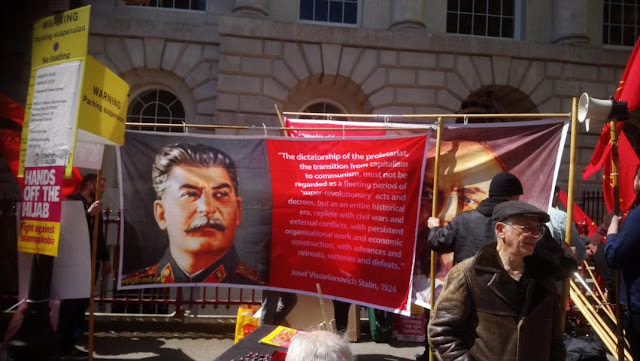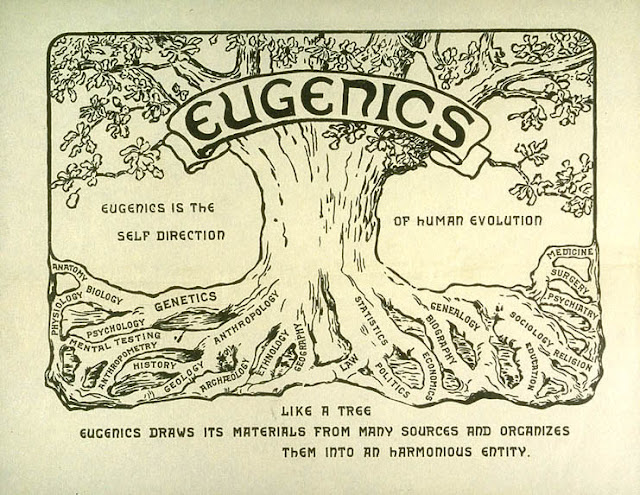Populism Means Hierarchy Which Means The Intelligent Are Back In Power
We live on the edge of vast change. An older has died after fifty years of supreme power; now, it has revealed that it has failed. Even more, it has shown us that it was never sincere and that its ultimate goal is tyranny, or leadership that serves itself instead of the future of our people, our culture, and our civilization. That realization makes us turn toward those things again, rediscovering their value.
Even more ominous, we are about 230 years into a system -- democracy -- that usually fails at the 250 year point. Since the French Revolution in 1789, the fortunes in the West have fallen, when we look at social order, but our bank accounts have risen thanks to our reckless use of technology. During that time, we have plundered the globe and left it strewn with human waste and litter, with its natural ecosystems weakened.
During the same time we have lost much of our culture. Customs are dead, as are graceful interactions, and art and literature are pale shadows of themselves, mainly churning out self-obsessed navel-gazing instead of accurate and insightful interpretations of our world and our souls. Architecture is ugly. Our cities look third world, streaked in filth and wracked by constant low-level graft and crime.
In 1968, a coup took over the West: the Western European people were replaced by others who were "white" in the sense of having mostly European DNA, but the root of Western Civilization was broken through the adulteration found in Southern Europeans, Mediterraneans, Eastern Europeans and The Irish (need not apply).
Across Europe, traditional governments and attitudes were thrown out and replaced with a new form of Marxism -- called by some "neoliberalism" -- that combined free markets with high taxes to fund a socialist welfare state. This carried on what had been the preferred form of government after WW1 but had been interrupted by the reaction to it through Right-wing forms of it like fascism and National Socialism.
With the Nazis defeated and dead, the Soviets seeming to be winning the Cold War, and the West tearing itself apart about diversity and the inequalities of race, Western governments threw a bone to the Left and adopted a Leftist program, at which point the newly-empowered student rebellions in the US and France led the way to deposing the families that had formerly ruled the West and replacing them with a new, mixed-white population.
From 1968 to 2018 was but fifty short years, much like from 1789 to 1989 -- the end of the Reagan era -- was just two centuries. During that time, Leftism had advanced in power, and now, people were expecting results from those who had made Utopian promises. In lieu of those results came systematic failures, first with the race riots of the 1990s and then, during the Obama years, with an intensification of racial animus not its reduction.
Twenty years past 1968, the students who were in the twenties during the Marxist revolution found themselves hitting their forties and by the nature of turnover, rising into power across the board. This enabled them, under the wings of the immensely popular Bill Clinton, to implement the precursor to their 1960s regime: a multicultural, tolerant, pluralistic, and thoroughly bureaucratic state... in other words, Soviet Lite.
Where the cry had previously been for fairness, the new group now revealed exactly what their agenda had always been, and screamed out for equality in the same way that the French Revolution-era Leftists did. In response to this new egalitarianism, populism arose, which looking past its misnomer is a desire for the spirit of the civilization to lead, not mob rule.
"Spirit" of course presents a troubling term. It cannot be perceived equally, so naturally implicates hierarchy: those who understand it can implement it, like shamans of the political zeitgeist, and the duty of everyone else is to follow so that we can avoid the crisis of Leftism and its Full Soviet endgame looming over our heads.
Hierarchy represents an opposite to equality. In equality, all share the same importance and some things are delegated to a bureaucracy to administrate as an external force to the group, so it does not have a higher social status than its citizens. Once we start talking about spirit, purpose, values, standards, customs, or beliefs, equality has gone out the window because there is a right way and there is a wrong way to go about living, which means that the anarchic "every way is right as long as a person wants it" has become abolished.
We are now seeing a backlash against humanism, or the idea that every human is equally important and their choices are magically not just valid but sacred, as people turn toward the idea of social order as a replacement for equality:
Strip away the activist language and what emerges is a human rights movement forced to refight and relitigate battles it once thought won. Human Rights Watch is not alone in calling for an all-hands-on-deck response from its supporters. In its own 2017-2018 report, Amnesty International states: “Over the past year, leaders have pushed hate, fought against rights, ignored crimes against humanity, and blithely let inequality and suffering spin out of control.” But, like Roth, the authors of the Amnesty report conclude that “while our challenges may never be greater, the will to fight back is just as strong.”
...Implicit in the liberal human rights narrative is the idea that once binding legal norms are set, realities on the ground will eventually conform to them. It is a legal approach that simply has no place for German scholar Carl Schmitt’s idea of the law as inseparable from politics, rather than above it. As far as the human rights movement has been concerned, once what the writer Michael Ignatieff called the post-World War II “revolution of moral concern” got fully underway, it was a matter of when — not if — an international system based on human rights would prevail throughout the world. But for the moment, at least, Brexit, Donald Trump’s presidency, and the steady rise of China have shattered the human rights movement’s narrative that progress is inevitable.
For over two centuries now, the right answer to any question has always been to help the underdog. The poor, the marginalized, those of minority race, ethnicity, or religion become useful justifications for any policy. If it helps the poor, it wins; if it does not, it will be construed as going against the dominant idea of egalitarianism, and therefore rejected as part of The Enemy.
During the last five decades, but especially since the late 1980s when the Left formulated diversity as a strategy against Reaganism, the correct answer has involved race, ethnicity, and religion in a pluralistic context -- where we "agree to disagree" and keep multiple belief systems within the same society -- and how expanding diversity always means a good thing because it is helping the underdog.
However, with the rise of minority-majority populations, the notion of "diversity" lost its appeal. It turns out that Machiavelli was indeed correct and every population acts in its own interests, which is to be a meek victim until it has enough power to beat down the other guy, much as Leftists did. Our continued racial warfare under Obama was not the sign of diversity being reduced, but increased in intensity.
Radical change means the fall of the old order and the rising of the new, which in our case means that liberal democracy will have reigned from 1789-2019 and then passed into history, joining Communism, National Socialism, and Fascism as failed modern experiments:
In March, Mines was one of several national-security experts whom Foreign Policy asked to evaluate the risks of a second civil war—with percentages. Mines concluded that the United States faces a sixty-per-cent chance of civil war over the next ten to fifteen years. Other experts’ predictions ranged from five per cent to ninety-five per cent. The sobering consensus was thirty-five per cent. And that was five months before Charlottesville.
...Mines cited five conditions that support his prediction: entrenched national polarization, with no obvious meeting place for resolution; increasingly divisive press coverage and information flows; weakened institutions, notably Congress and the judiciary; a sellout or abandonment of responsibility by political leadership; and the legitimization of violence as the “in” way to either conduct discourse or solve disputes.
...“When you look at the map of red and blue states and overlap on top of it the map of the Civil War—and who was allied with who in the Civil War—not much has changed,” Judith Giesberg, the editor of the Journal of the Civil War Era and a historian at Villanova University, told me. “We never agreed on the outcome of the Civil War and the direction the country should go in. The postwar amendments were highly contentious—especially the Fourteenth Amendment, which provides equal protection under the law—and they still are today. What does it mean to deliver voting rights to people of color? We still don’t know.”
The United States chose diversity as the hill that it wanted to die upon. Following notions of American exceptionalism and attempting to be a "city upon a hill," America wandered straight into Leftist theory, at which point "good" became defined as ever-expanding equality, an event which apparently coincided with the arrival of ethnic diversity -- at first, non Western European people who were still Europeanish -- and accelerated after WW2.
This forced equality to define itself as a collection of ideas -- feminism, diversity, globalism, LGBT special privileges -- which have in turn made it easy for a backlash to occur, because all a critic has to say is that they no longer believe in equality as an affirmative direction which we must take. In other words, equality cannot be the basis of policy; we hope for it, maybe, but we do not act to socially engineer it.
Populism rose out of this from the realization that if we are not equal, we need champions to correctly apply policy instead of relying on what the herd says, because in a large enough group of people, "equality" is the only thing that most will agree on. To re-state Robert Conquest's Second Law, if an organization is not explicitly anti-egalitarian, it will become egalitarian over time, even if branded conservative.
Our egalitarianism started in a political sense, but then because of policies we adopted, became financial dogma as well. The welfare benefits states of Europe and America committed themselves to pay out much more than they could reasonably take in, and much of our political infighting has involved trying to limit the constant taking so that the economy does not suffocate.
This created a situation where we thought entirely in terms of backward-looking materialistic concerns. We need to pay for programs we created, so we find ways to do that, instead of thinking about what future direction we want and whether we can simply discard the failing or change direction. Europe imported its diversity to tax it and pay for the social benefits paid to those who were born at the time when WW2 was ending, and America followed.
The Civil War that appears in our future no longer divides regions, but types of people. Some cling to the old order and want to believe we are all equal; others have escaped the equality mental fugue state and now no longer want to go down that direction. These two extremes cannot compromise, guaranteeing that clashes will accelerate in the future.
Within the framework of egalitarianism, we can only think in terms of people as nearly identical units who require the right propaganda, indoctrination, and memorization of procedures to do more. As our fascination with materialism fades, so does our belief in human uniformity, and with it, hierarchy is re-appearing on the horizon of our consciousness.




Comments
Post a Comment